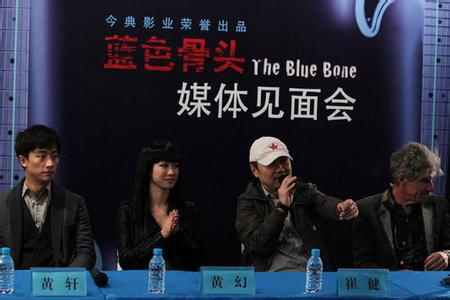(单词翻译:单击)
Cui Jian, China’s godfather of rock music, has two new titles: award-winning film director and screenwriter.
中国的摇滚教父崔健,最近又获得了两个新头衔:“获奖”电影导演与编剧。
His directorial debut, Blue Sky Bones, which garnered international recognition in Rome International Film Festival in late 2013, is beautifully accomplished, especially compared to his last attempt as a filmmaker — the 30-minute segment of the 2009 two-part movie Chengdu, I Love You— which was a chaotic jumble of ideas.
在2013年末的罗马国际电影节上,他的导演处女作《蓝色骨头》赢得了国际认可(获特别推荐奖)。尤其与他杂乱无章的上一部作品—— 2009年拍摄的30分钟短片《成都,我爱你(上、下)》相比,《蓝色骨头》是一部完成度很高的电影。

The premise of Blue Sky Bones, briefly speaking, is a story about the “cultural revolution” (1966-76) told by a young computer hacker. It has two storylines: one about the hero Zhong Hua (Yin Fang), an underground songwriter who makes a living creating computer viruses and then selling anti-viruses to neutralize them; the other one about the love triangle of Zhong’s parents during the “lost 10 years” of the “cultural revolution”.
《蓝色骨头》的背景简单而言,即以一位年轻黑客的视角,讲述了1966至1976年“文革”期间的故事。全片有两条主线,一条是主人公——地下作曲家钟华(尹昉 饰),他以贩卖查杀自己写的电脑病毒的杀毒软件为生。另一条线则围绕钟华父母 “迷茫十年文革”间的三角恋展开。
Through flashbacks to the past and a jungle of thoughts expressed by the central character in philosophical voiceovers, the movie has a strong emotional thread and observes the lost generation of the “cultural revolution” through the eyes of a young man who’s trying to make sense of his life in an age of the Internet, music downloading and forgetfulness of the past.
影片思想丰富,情感主线突出,通过倒叙的手法以及核心角色哲人般的画外音,向我们展示了一个生活在上网、下音乐、遗忘过去的时代里努力寻找生命意义的年轻人,和他眼中“文革”时迷茫的父辈们。
Cui has described his role on the film as “orchestrating the actors, the music and the script” and leaving the rest of the production work to professionals in each field. Cui’s use of music binds together the whole structure of the film, giving it a genuine dramatic power that compliments the emotive voiceovers by the main character.
崔健说自己在电影拍摄时的角色就是“协调演员、音乐和剧本”,至于其他制作工作,自有其领域的专业人员打理。但正是他用音乐串联起了整个电影情节架构,为主人公饱含深情的旁白赋予了戏剧化的张力。
Cui’s wisest choice, however, was hiring Australian cinematographer Christopher Doyle, who is known for his work on Wong Kar-wai films. Doyle’s photography brings atmosphere and shape to the story as it jumps between past and present.
崔导最明智的选择莫过于请来了王家卫的御用摄影师——来自澳大利亚的杜可风。正是他的拍摄,让故事在过去与当下间完美穿梭。
The most noticeable weakness about the film is the script. Cui’s got so much ambition in storytelling that the two subplots don’t sit comfortably within the movie.
相比之下,剧本成了全片最明显的软肋。崔导想要讲一个太过宏大的故事,以致影片的两条副线显得有些不协调。
But the movie does all come together in its final sequence, which creatively cross-cuts between scenes of a timeless China on the Yangtze River with Zhong performing the title song. Cui’s embracing of traditional values of love and forgiveness, in such a genuine way, is quite surprising. It reminds us of a fact that no one wants to accept: the bad-boy rocker, now 52, has finally hit middle age.
好在影片还有充满创意的最后一镜,当扬子江上的不老中国与唱着主题曲的钟华交叉剪辑在一起,千头万绪也终于汇聚一处。崔健能以如此真诚的方式传递传统价值观中的爱与宽恕,着实令人惊讶。而这也提醒着我们一个难以接受的事实:这个现年52岁的摇滚“坏男孩”,已然人到中年。


